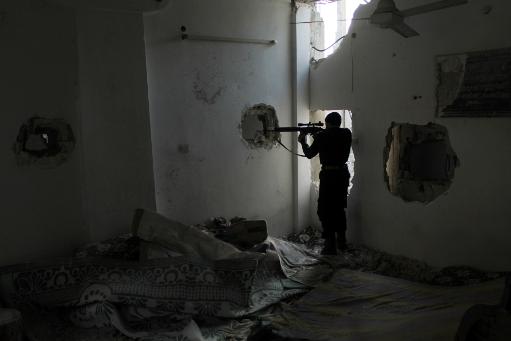The top UN official charged with destroying Syria's chemical weapons stockpile on Monday warned that the most difficult part of its mission in the conflict-ridden country still lay ahead.
Meanwhile, a top Syrian official has urged countries "to start acting" to help Damascus comply with its obligations to help destroy its arsenal, including providing armoured vehicles and equipment.
Speaking at an annual meeting of member states of the Organisation for the Prohibition of Chemical Weapons (OPCW) in The Hague, Sigrid Kaag said although Syria's ability to make chemical weapons "has been rendered inoperable... the most complex and challenging work still lies ahead".
"The removal of Syria's chemical agents for destruction outside of its territory will require tremendous coordination and collective effort," Kaag told delegates at a five-day meeting of the 190 member states of the world's chemical watchdog.
A joint team of UN and OPCW inspectors have inspected all but one of Syria's chemical weapons-producing sites and the OPCW has said that Damascus' entire stockpile of more than 1,000 tonnes of chemical weapons has been placed under seal.
Despite "significant milestones" already achieved by the joint UN-OPCW team, which has been in Syria since early October, challenges remained, Kaag told delegates.
The shifting security situation in Syria -- where nearly 126,000 people have been killed since the brutal conflict broke out 33 months ago, according to latest NGO figures -- was a major obstacle facing inspectors, she said.
Kaag said although the inspection team was working hard to achieve deadlines, there were "a number of factors outside the joint mission's control to adversely impact... our ability to achieve objectives within mandated timelines."

For example, a recent customs strike in Beirut delayed the arrival of materials needed in Damascus by several days, she said.
The OPCW earlier this month adopted a final roadmap for ridding Syria of its arsenal of more than 1,000 tonnes of dangerous chemicals by mid-2014.
According to this roadmap, "priority" weapons have to be removed from Syria by December 31 and destroyed by the end of March 2014, and the rest by mid-2014.
Under the plan, resources for packaging and handling the chemical materials would be sent to 12 chemical storage sites by December 13 after which the chemicals would be taken to Latakia, Syria's main port on the Mediterranean, and shipped out by February 5, a diplomatic source previously told AFP.
The OPCW on Saturday said the US has offered to destroy Syria's most dangerous chemical weapons on a vessel at sea through a process of hydrolysis.
It added that 35 commercial companies have expressed an interest in destroying lower priority, less dangerous weapons.
According to a US-Russia deal that headed off US military strikes against President Bashar al-Assad's regime, Syria is to destroy its chemical arsenal by mid-2014.
Syrian Deputy Foreign Minister Faisal Mekdad told the meeting Damascus has achieved "exemplary results" in its cooperation to destroy its weapons stockpile.
He called on more countries to help support Syria's effort.
"We know that many states can provide assistance," Mekdad said.
"However, most of these states merely make declarations. We urge all states who can do so to start acting," he said.
The Syrians have requested equipment to help the process, including armoured 4x4 vehicles and electronic counter measure (ECM) equipment. But Western nations will not supply them as they could be used against rebels.
Mekdad however denied that Syria would use the equipment for hostile purposes.
"Armoured vehicles, transportation facilities, resources for transporting the materials and (equipment) to monitor movements," were needed, the Syrian official said.
"We shall be acting in a hostile atmosphere that can threaten the lives of those who are undertaking the job."
"We need the requirements to be available so that we can conduct a safe and successful operation," Mekdad said.















Comments About This Article
Please fill the fields below.